Trying to find out whether ServiceNow or Monday is the better IT service management solution for your company?
Both ServiceNow and Monday are well-established in the ITSM space: ServiceNow with its enterprise-grade depth and CMDB-first approach, and Monday with a focus on fast time-to-value, visual configurability, and cross-team service management built on a shared Work OS.
Choosing the right fit will ultimately depend on your enterprise’s size, budget, and how mature your ITIL/process already is.
➡️ In this buyer guide, I’ll break down the key functionalities, pricing, and testimonials for both platforms to help you make a better decision.
💡 I’ll also introduce you to a third tool that combines flexibility, affordability, and ease of use in one comprehensive ITSM platform: SmartSuite.
TL;DR
✅ ServiceNow is best for organizations looking for an ITIL-aligned ITSM platform that comes with a broad ecosystem of modules (incident, change, asset, service management), advanced automations, and plenty of integrations.
Despite this, the tool can be expensive and often complex to implement and maintain, according to users of the platform.
✅ Monday offers a strong choice for organizations that want a configurable, low-code ITSM platform that combines ticketing, asset lifecycle tracking, automated routing, and an AI-assisted service agent.
However, extracting enterprise-grade CMDB/ITIL depth (i.e., deep discovery, complex change orchestration and heavy bi-directional system integrations) can require extra implementation effort.
✅ SmartSuite offers an all-in-one work management solution that goes beyond ITSM. The platform combines customization, templates, and built-in communication features at a significantly lower entry price and is ideal for both SMEs and enterprises looking to start with ITSM in days and not months.
Despite this, when compared to the 2 other solutions, its integration depth is currently more limited.
ServiceNow vs. Monday vs. SmartSuite: ITSM Features
TL;DR:
- ServiceNow comes with advanced ITSM modules for incident, change, problem, and asset management. The platform also excels with its deep ITIL alignment, extensibility, and comes with a large marketplace of integrations.
- Monday offers an operations-first ITSM approach built on its Work OS that combines ticketing and self-service portals, linked asset & inventory records, no-code automations for routing, escalation and SLA enforcement, plus AI-powered triage and knowledge surfacing.
- SmartSuite is a no-code, all-in-one IT service and project management software that lets you standardize service requests, ticketing, asset tracking, and internal IT projects. The tool stands out for teams looking to deploy their IT service desk sooner rather than later and standardize IT processes.
Let’s go over the 3 solutions’ features, starting with SmartSuite: 👇
SmartSuite’s ITSM Features
SmartSuite is a no-code, easy-to-manage ITSM platform that helps you standardize critical IT processes, organise projects, and remove the traditional obstacles in the tech space.
We know that it’s a struggle to keep your IT services efficient and reliable, and we also understand that you don’t want to settle for costly, fragmented tools.
Our platform eliminates the complexity by uniting IT Service Management, IT Operations and IT Business Management in one platform.
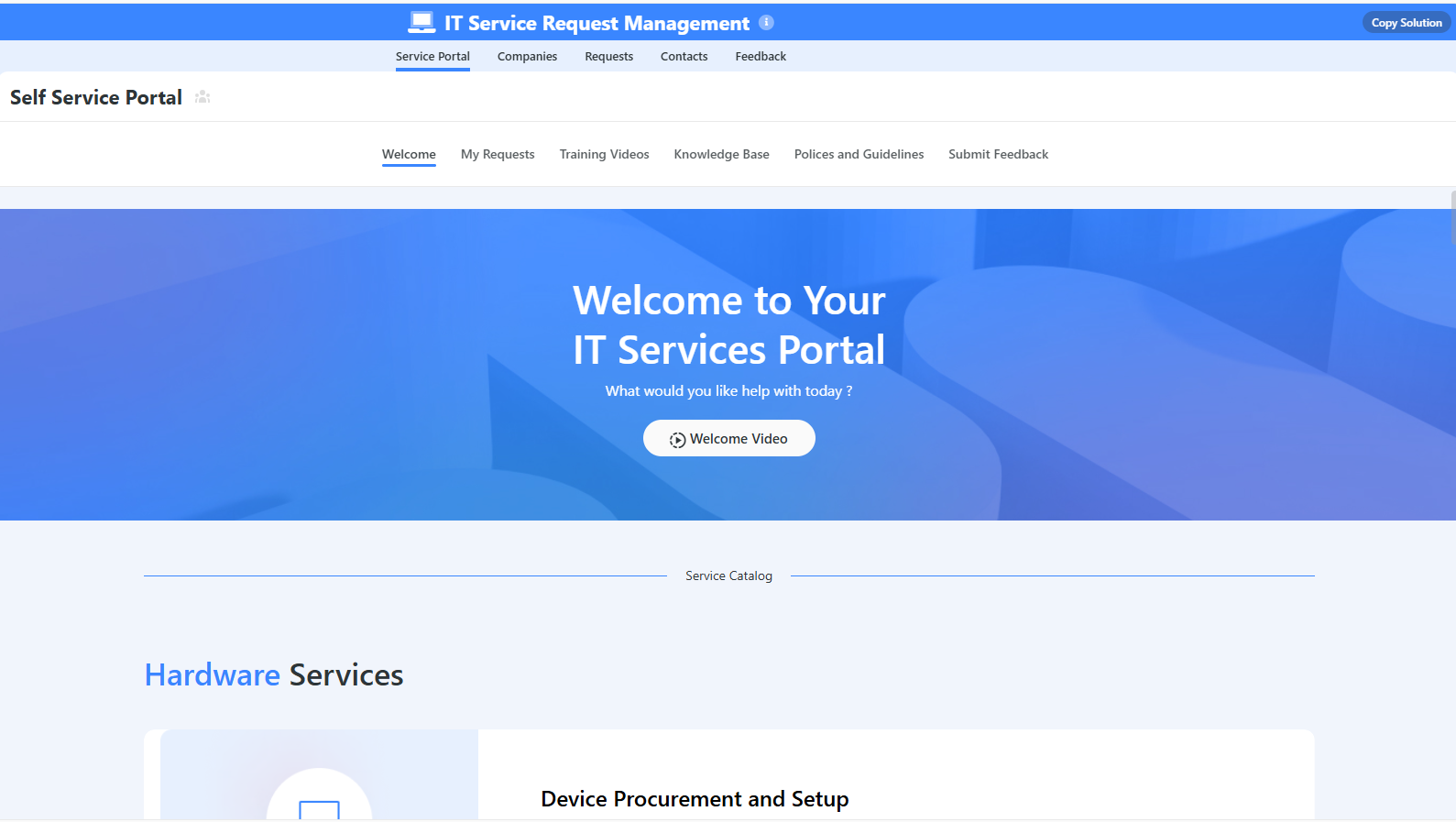
Here’s a walkthrough of how our platform can help you simplify your IT service operations:
Let’s go over the capabilities that make SmartSuite the best choice for small and large IT teams looking for an ITSM software: 👇
All-In-One IT Service Management
SmartSuite helps both SMEs and enterprises manage their IT processes, projects, and assets in a single, unified solution.
Our no-code, easy-to-use platform lets you automate all technical processes with ease.

Here are the IT use cases that your team will get with SmartSuite:
- Manage critical IT processes: You’ll be able to manage data and IT workflows in one place, from deploying help desk and issue management solutions to ensuring core business operations stay uninterrupted.

- Track tickets & issues: Deploy a help desk and issue management solutions.

- Manage your IT assets and licenses: Track all of your IT assets, to whom they are deployed, and which tool versions are deployed.

- Manage internal IT projects: Your team will be able to plan deployments, schedule your teams, and monitor progress to ensure you deliver on time and under budget.

- Integrate with your existing systems and data to consolidate and centralize your data.

- Automate for accuracy and efficiency: Remove inefficiencies and human error by automating repeatable workflows.
- You can monitor and report on your work with customizable IT dashboards: Track help tickets, work requests, and more in dynamic, interactive dashboards.

Standardize Your Team’s IT Workflows
Your team can streamline request workflows with a centralized work request process.
Our software lets you prioritize tasks, assign IT staff and ensure that you achieve SLAs.

You can also monitor your IT department with flexible reports and dashboards that keep you updated in real time.
Apart from that, SmartSuite's no-code automation builder provides IT teams with a visual interface that makes it easy to respond to events and take action.
That means your team can customize your ITSM workflows without technical resources.
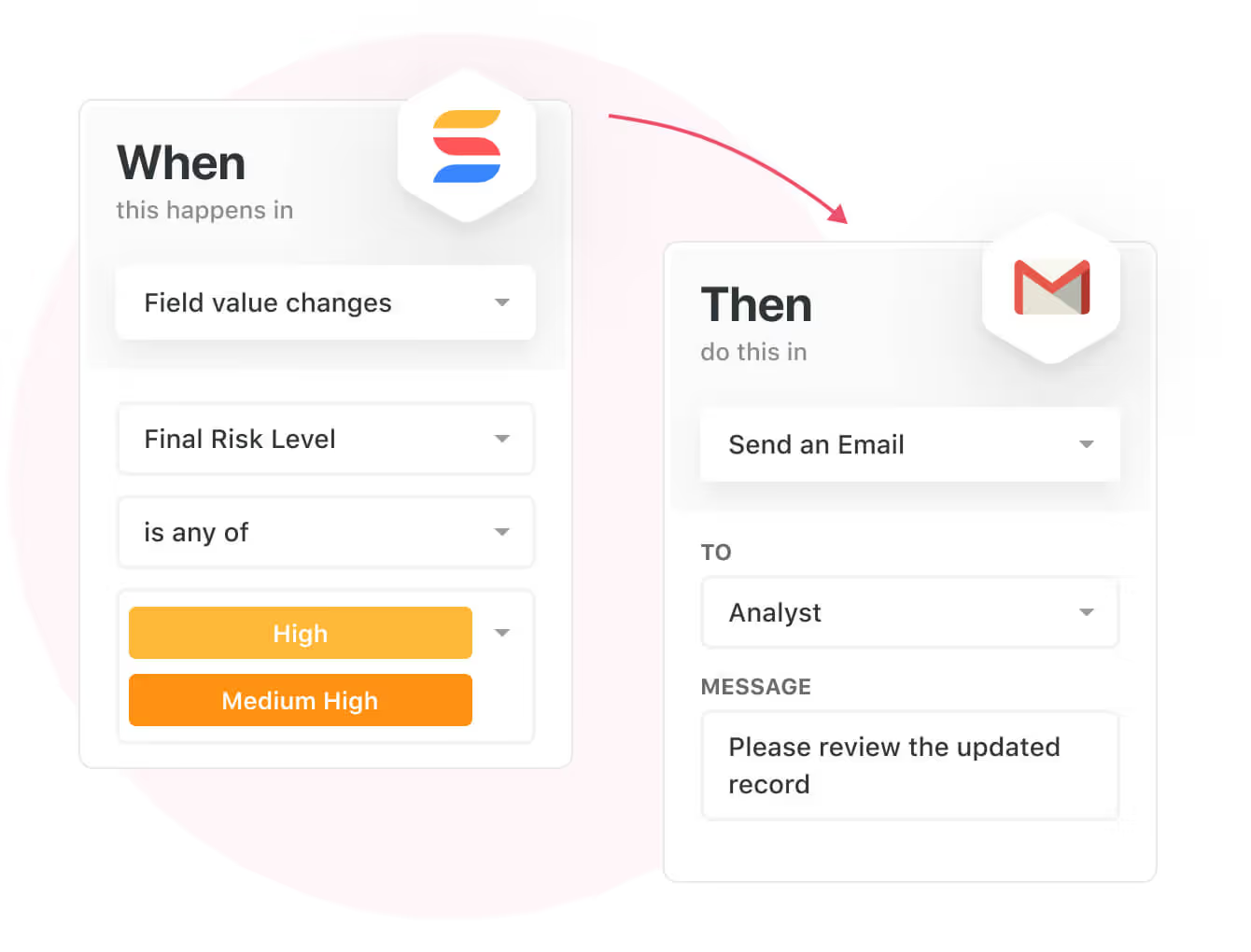
💡 Working on mobile? You’ll be able to stay connected to critical IT information, tickets and device information with our native iOS and Android apps.
It’s possible to use our mobile app to share files, images, updates and other feedback to resolve problems and close tickets.

Pre-built ITSM Templates
We have prepared a few ITSM templates for IT teams looking to get started right away, instead of building everything from scratch, such as an IT Help Desk.
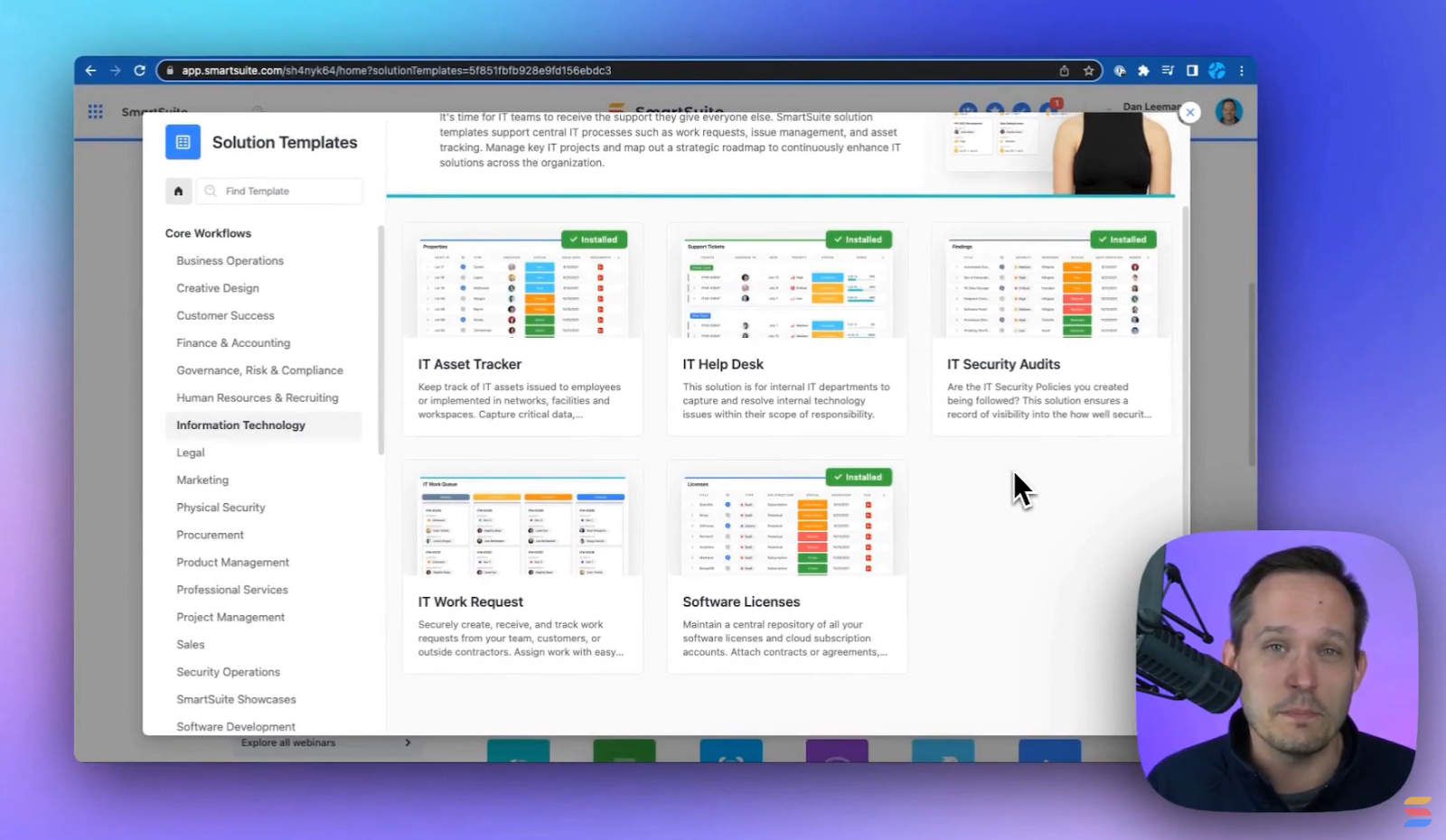
Our ITSM template includes:
- IT Service Request Management, where your IT team can streamline work requests, automate repetitive tasks, and manage IT assets.
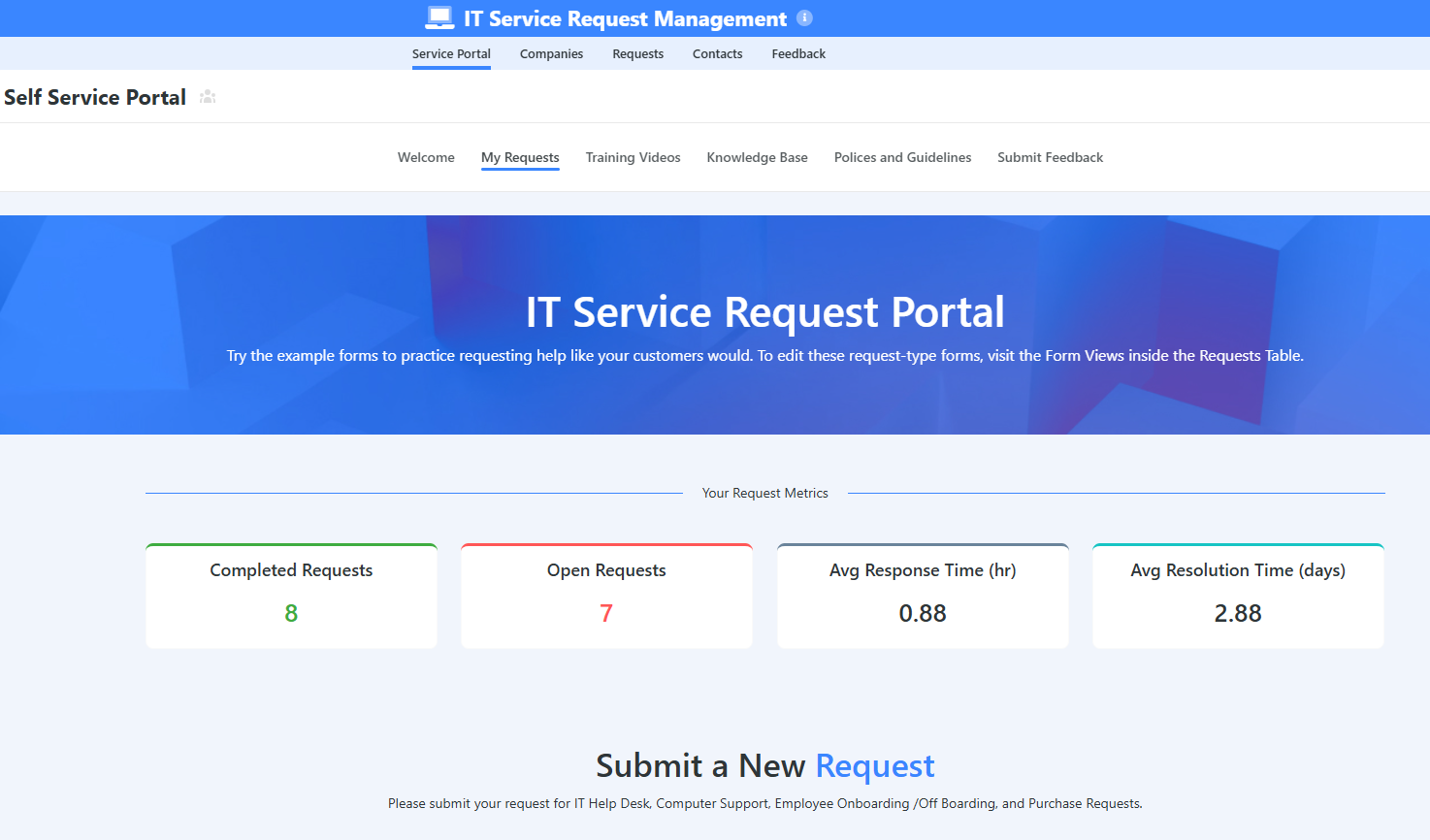
- IT Help Desk, which we built for internal IT departments looking to capture and resolve internal technology issues.
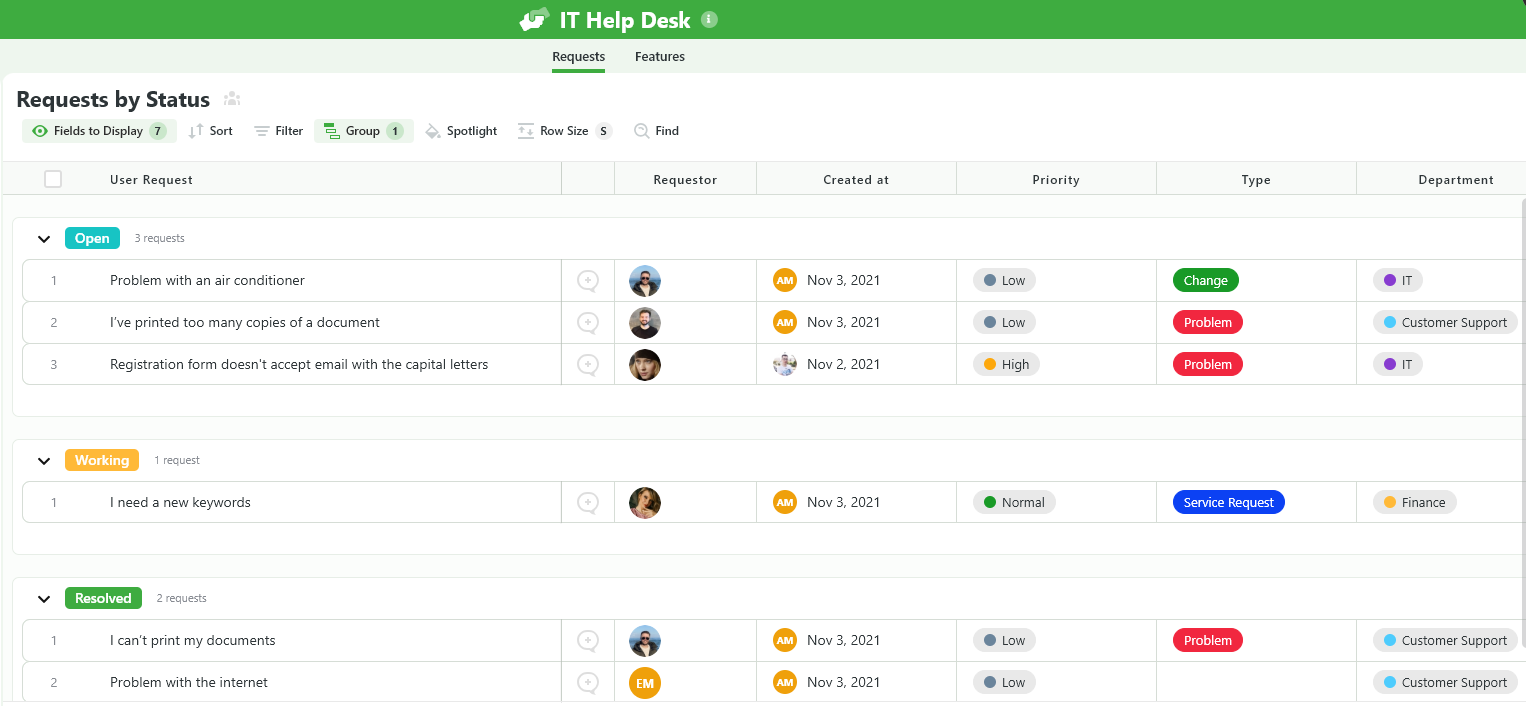
- IT Asset Tracker, where you can keep track of IT assets issued to employees or implemented in networks, facilities and workspaces.
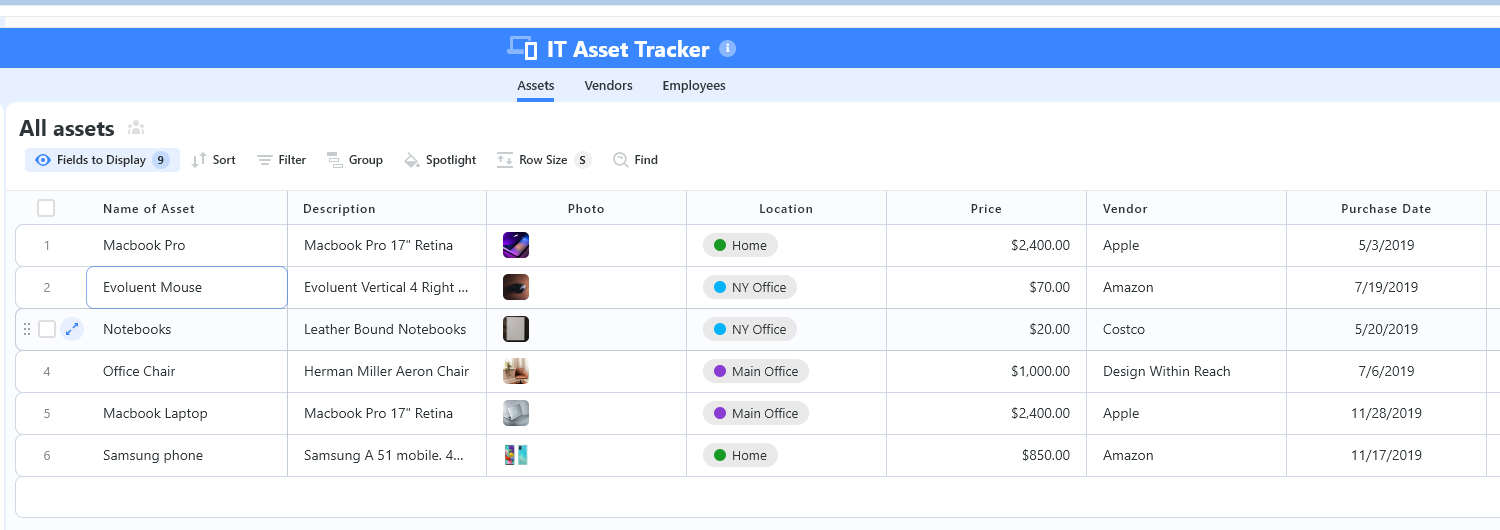
You can customize our ITSM management templates here for your organization’s required use cases, including IT Security Policies, IT Security Audits, and IT Work Requests.
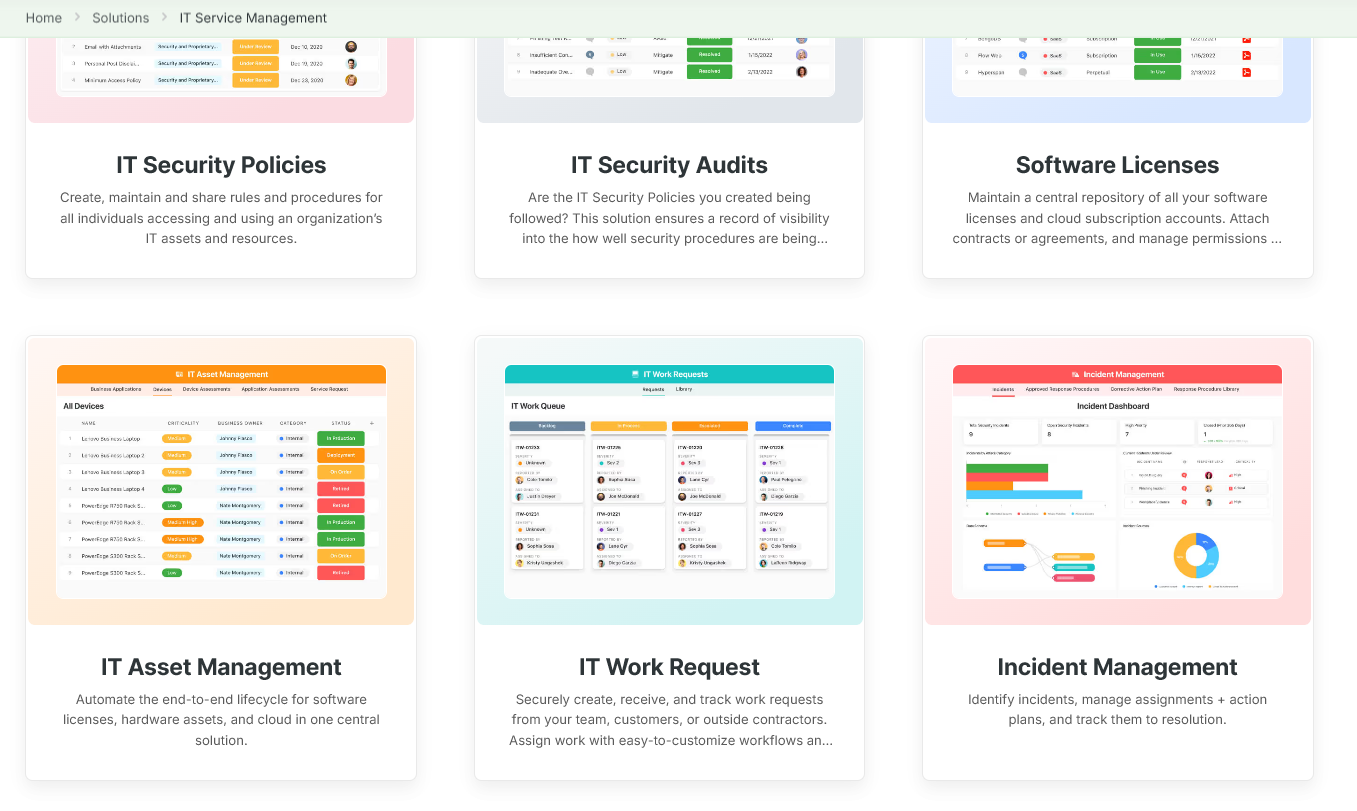
ServiceNow’s ITSM Features
Incident & Problem Management
ServiceNow is primarily an incident management software that helps you capture, prioritize, and resolve issues through a centralized interface.
The platform supports automated workflows for escalations and SLA tracking, ensuring critical tickets are addressed promptly.
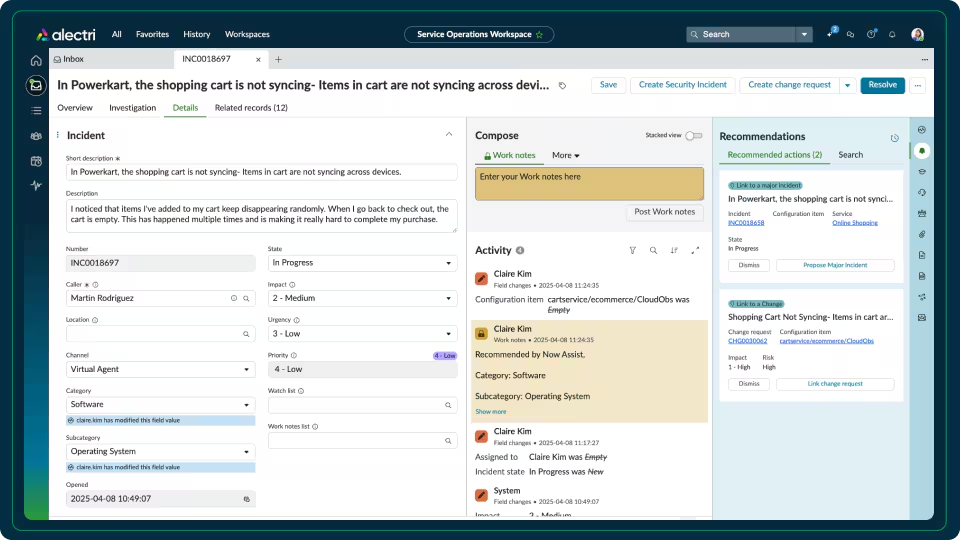
Its problem management capabilities let you identify root causes of recurring incidents and maintain a known-error database, so your IT fixes can be applied faster next time a similar issue arises.
➡️ These modules streamline issue resolution and reduce downtime by enforcing ITIL best practices and providing agents with all the context needed to better close incidents.
Change & Asset Management
ServiceNow’s change management capabilities let you plan and authorize IT system changes with minimal risk.
The tool provides structured change request workflows, integration with a Change Advisory Board (CAB), and a visual change calendar to avoid conflicts and schedule updates safely.
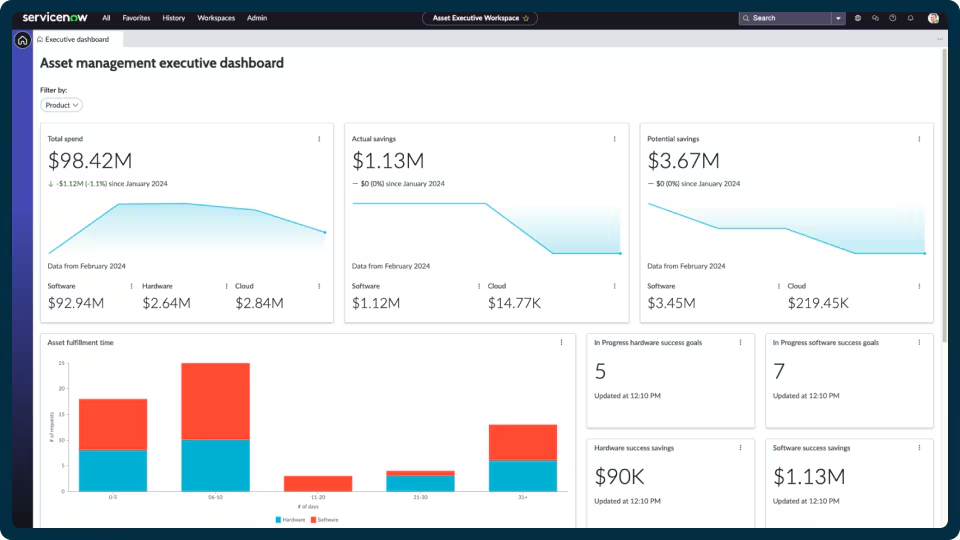
Alongside change management, the platform also includes a full asset management module that automatically discovers hardware/software and tracks inventory throughout its lifecycle.
➡️ You will be able to monitor warranties, licenses, and contracts to ensure compliance and optimize your team’s usage.
CMDB & Service Mapping
At the core of ServiceNow’s tool is the Configuration Management Database (CMDB), which is a single source of truth for all IT components.
The CMDB enables relationship mapping so your IT team can see dependencies between devices, applications, and services.
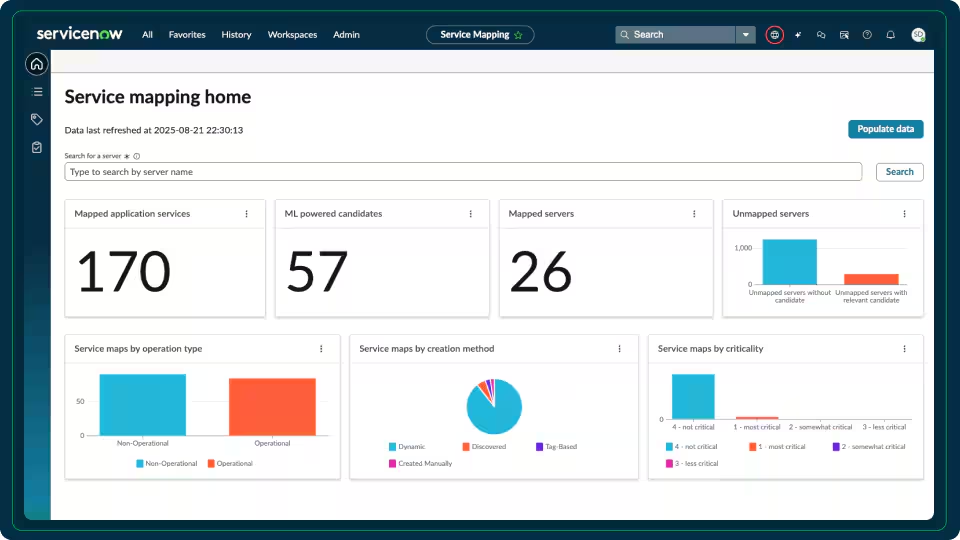
➡️ Before making any changes, your team can use the CMDB to predict how an update to one component might affect others (i.e., change impact analysis).
The software also offers service mapping that visually ties CIs (configuration items) to the services they support, providing you with a holistic view of the IT infrastructure.
💡 What this means for your IT team is that you can drill from a service outage down to the underlying components and respond with minimal guesswork.
Monday’s ITSM Features
Ticketing & Service Desk
Monday service provides a full help-desk and ticketing service built on Monday’s Work OS that lets teams capture requests via customizable forms and publish an employee portal for self-service.
Tickets turn into flexible records that can be routed, prioritized, and converted into projects when an incident requires deeper work.
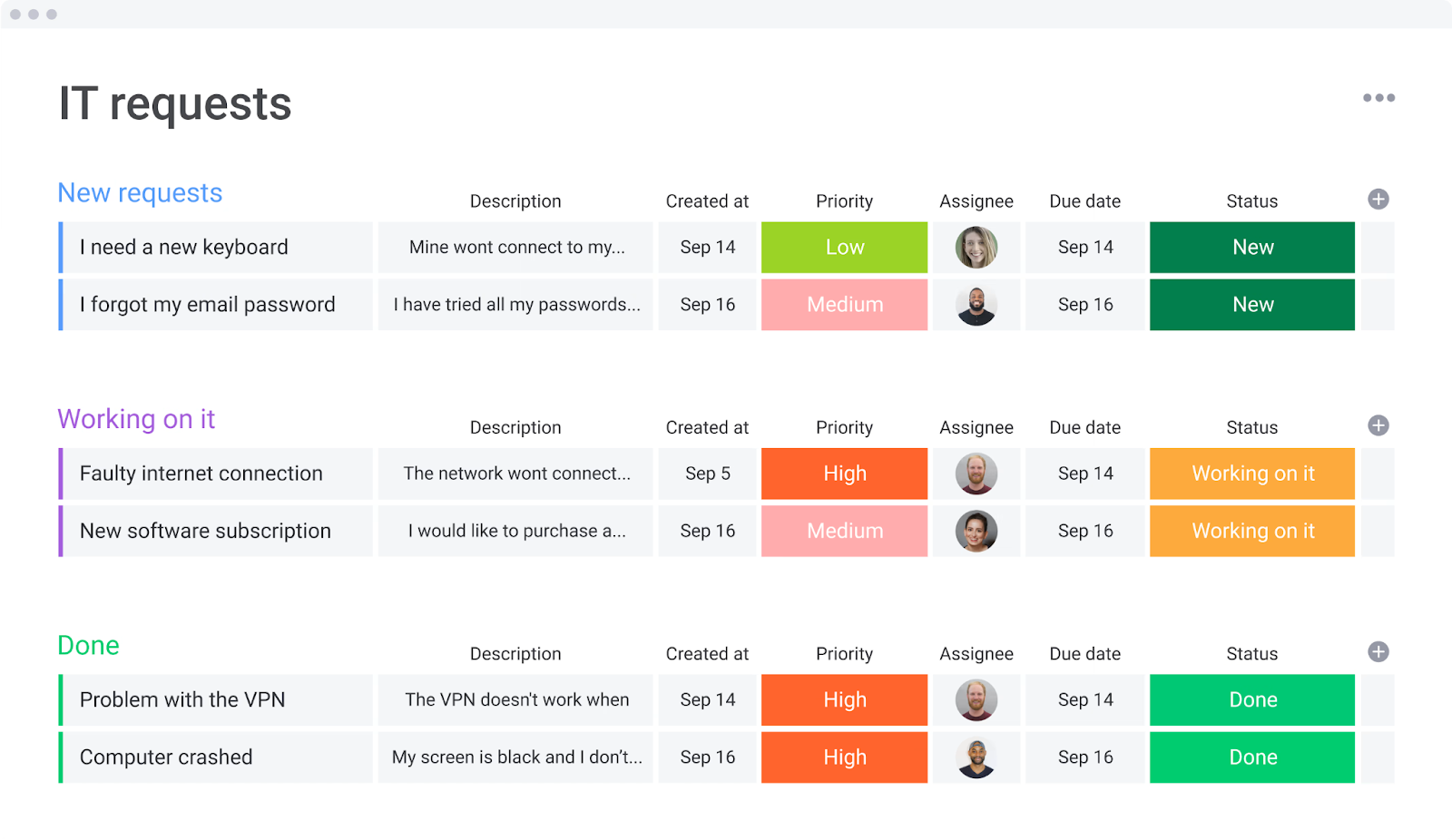
➡️ Your team can then add custom fields, attachments, and SLA fields to each ticket and view items in multiple perspectives (list, Kanban, timeline, etc.), making it easy for non-IT teams to adopt the system.
AI-Powered Service Agent, Auto-Categorization & Knowledge
Monday service includes an embedded AI service agent that assists with triage.
The tool can auto-categorize incoming tickets, suggest responses based on ticket history and the knowledge base, and surface relevant articles to end users and agents.
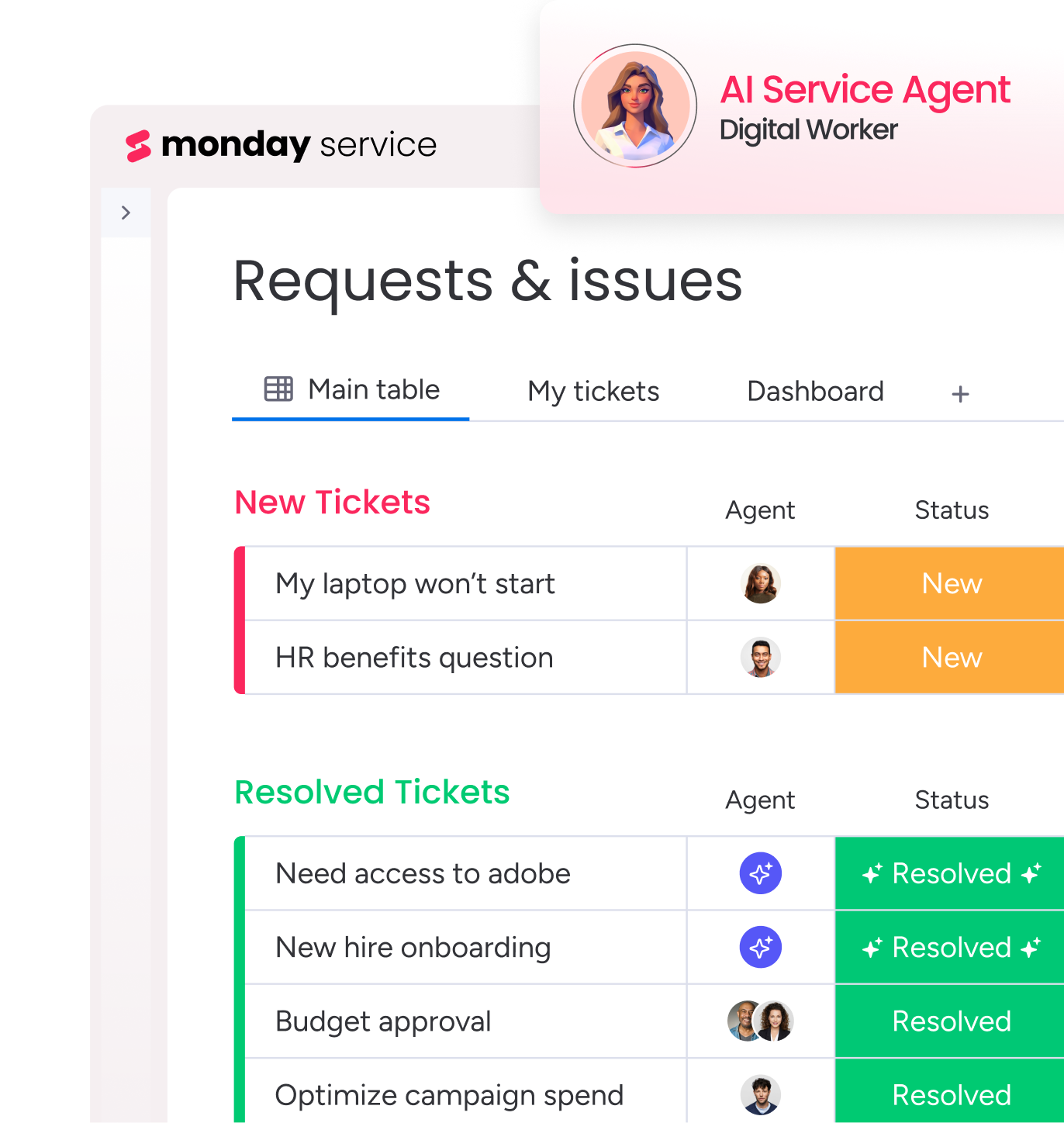
What I like about this AI layer is that it speeds first-touch resolution and reduces repetitive work by recommending routing or automated replies for common issues.
💡 The platform also supports an internal knowledge base you can link to ticket workflows, so agents and users get contextually relevant answers during triage.
No-Code Automations & Workflows
Monday’s automation builder gives you visual, no-code rules to drive ticket lifecycle actions.
For example, when a ticket status changes, you can reassign the owner, update an SLA timer, notify a Slack channel, or create follow-up tasks.
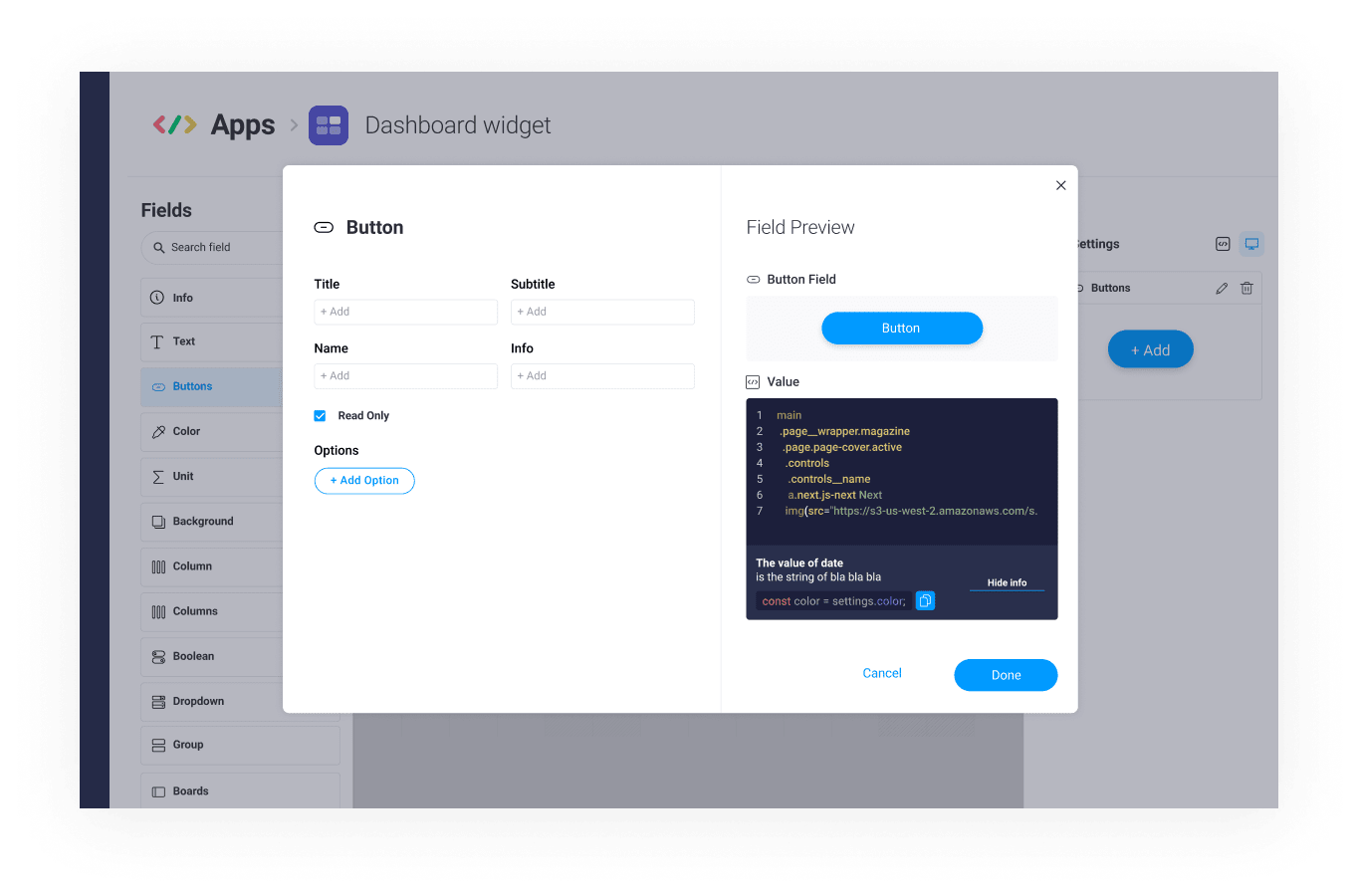
Automations are field-level and board-level, and they come with ready templates (you’ll also have the option to build complex multi-step flows).
You can also define escalation rules and SLA timers inside workflows so critical incidents jump to the right people automatically.
Integrations: ServiceNow vs. Monday vs. SmartSuite
SmartSuite’s Integrations
SmartSuite integrates directly with ITSM-related platforms and offers additional connectivity through Zapier, Make, and native API support.
The tool covers the essentials for IT departments looking to centralize service workflows, compliance, and incident management without heavy setup, including:
- Microsoft Teams and Slack for communication.
- Google Workspace and Microsoft 365 for productivity.
- Okta for identity and access management.
- Jira for development and issue tracking.
- Zapier & Make for extended workflow automation.
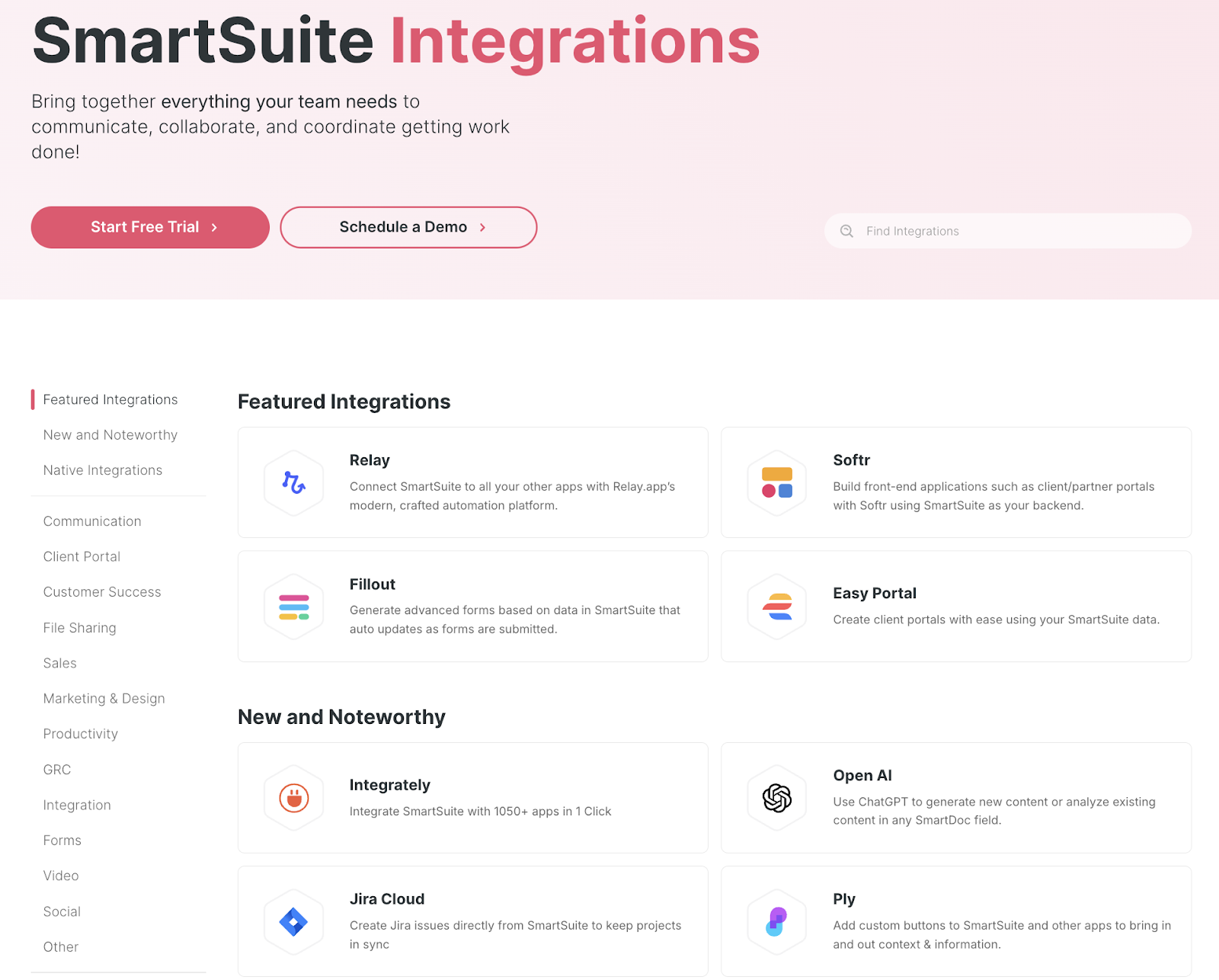
ServiceNow’s Integrations
ServiceNow offers one of the broadest integration marketplaces with its connectors and APIs for virtually every enterprise system.
From HR and finance to productivity and DevOps solutions, its ServiceNow IntegrationHub enables IT teams to unify workflows across business functions:
- Microsoft Teams and Slack.
- Jira and Confluence.
- AWS, Azure, and GCP.
- Splunk and Datadog.
- Okta and Active Directory.
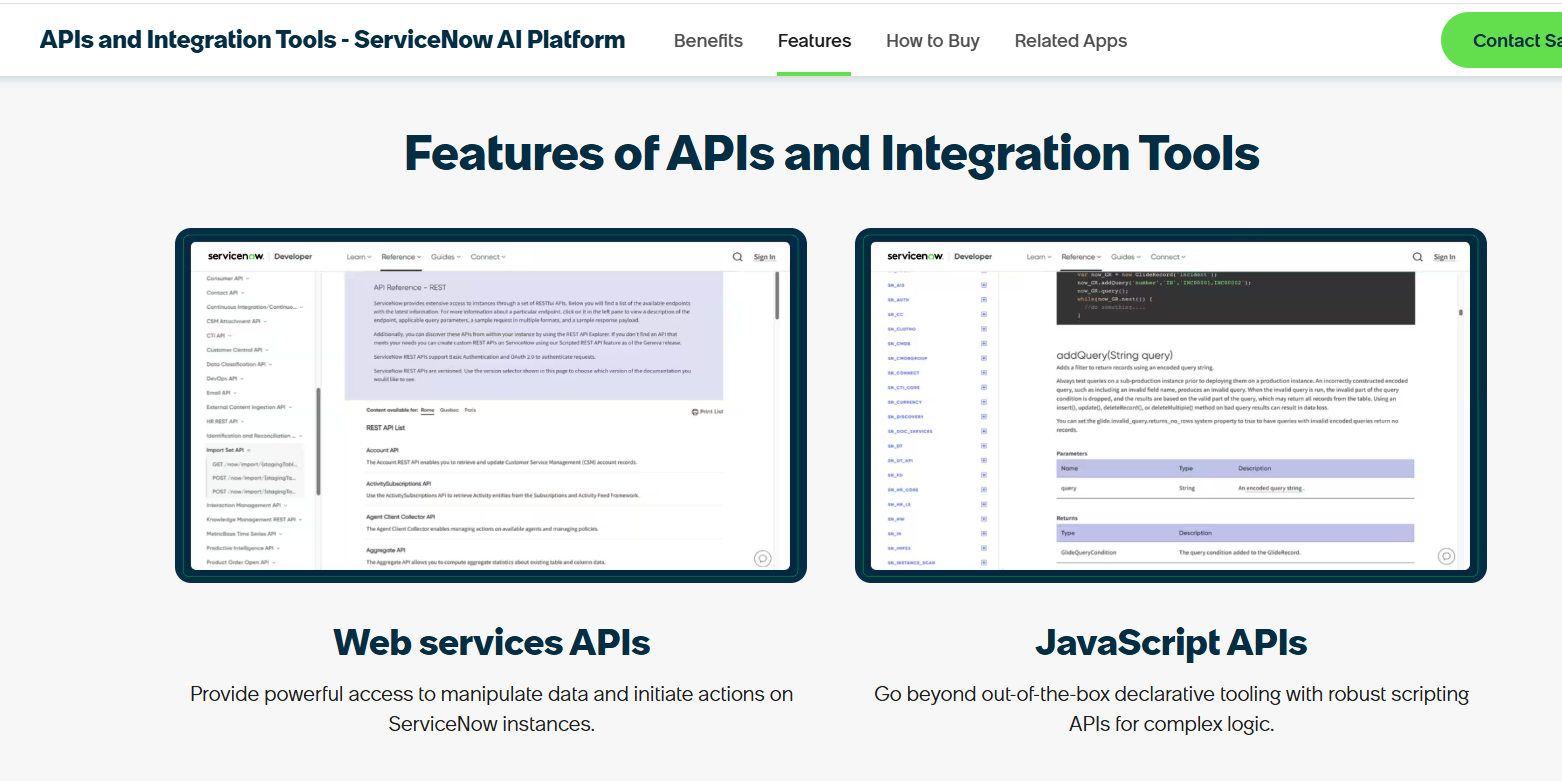
➡️ Note: Some of ServiceNow’s integrations can require additional licensing costs.
Monday’s Integrations
Monday’s integrations are built around unifying collaboration, ticketing, cloud, observability, and operational telemetry.
The goal of the tool’s integrations is to pull collaboration, ticketing, cloud, and tooling signals into a single operational model and let automations and dashboards act on that context.
The platform’s typical integrations include:
- Microsoft Teams, Outlook, and Microsoft Azure AD (SSO/user sync).
- Slack for conversational workflows and notifications.
- Jira, GitHub, GitLab, and Bitbucket for dev and incident-to-issue syncs.
- Zendesk and Salesforce for customer support and CRM ticket synchronization.
- AWS, Azure, and GCP for cloud inventory and event visibility.
- Splunk, Datadog, and other observability platforms for alert and event ingestion.
- Vulnerability scanners such as Qualys, Tenable, and Rapid7 to map CVEs to tickets.
- Endpoint platforms like Microsoft Intune and Jamf for device and asset signals.
- Identity providers like Okta for SSO and user provisioning.
- Endpoint security vendors (CrowdStrike, SentinelOne, Microsoft Defender) for telemetry and remediation triggers.
- Zapier, Make, Workato and other iPaaS platforms for multi-step automations.
- REST API, webhooks, SDKs and marketplace partner connectors for custom two-way syncs.
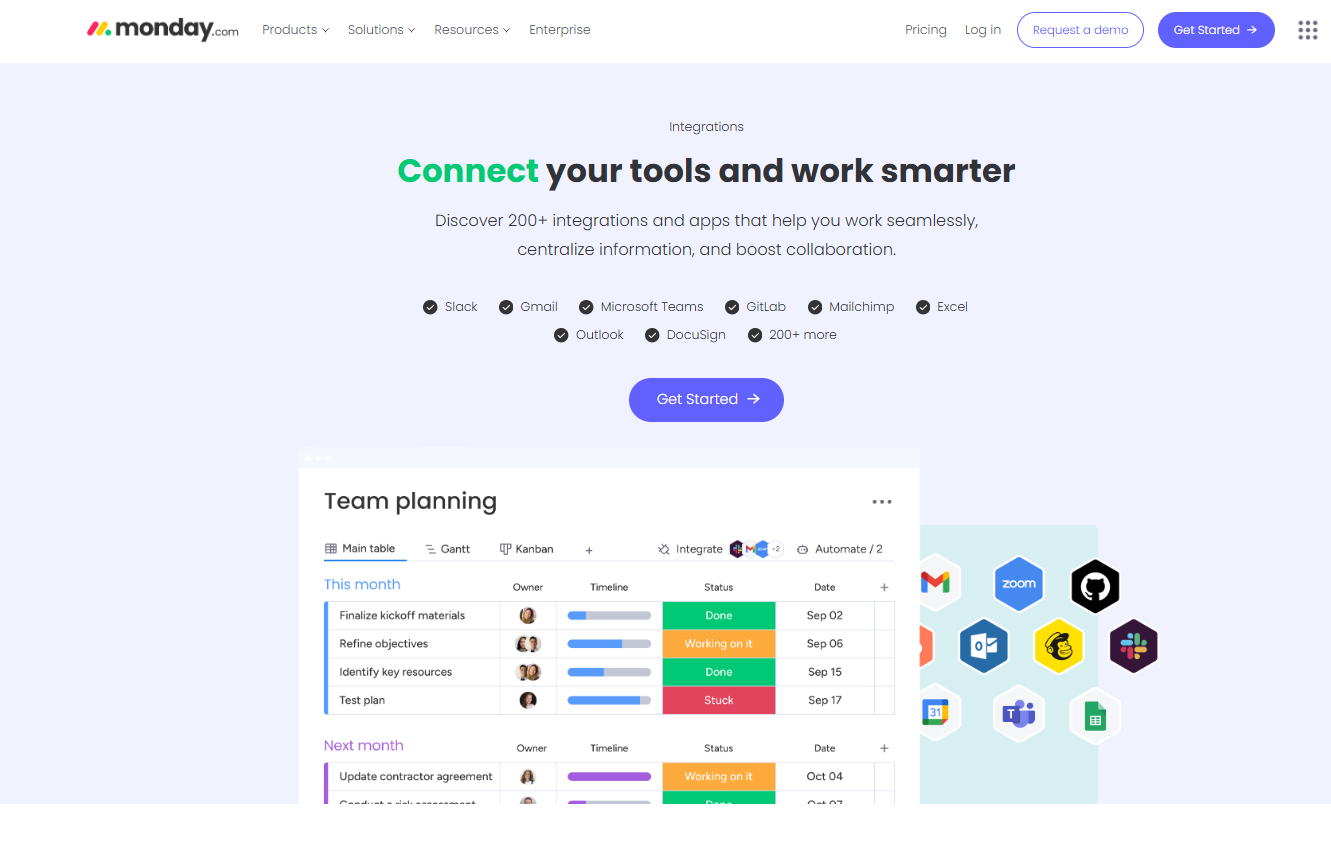
Pricing: ServiceNow vs. Monday vs. SmartSuite
SmartSuite’s Pricing
SmartSuite offers a free-forever plan that gives you access to 250+ automation actions, team collaboration, multi-dashboard views, and more.
There are four paid plans with a 14-day free trial (no CC required):
- Team: Starts at $12/user per month, including Gantt charts, timeline views, 5000 automation runs, and native time tracking.
- Professional: Starts at $30/user per month and adds two-factor authentication, Gmail & Outlook integrations, and unlimited editors.
- Enterprise: Starts at $45/user/month and includes access to audit logs, data loss prevention, and 50,000 monthly API calls.
- Signature: A custom plan tailored to your needs and team size with no predefined limits.
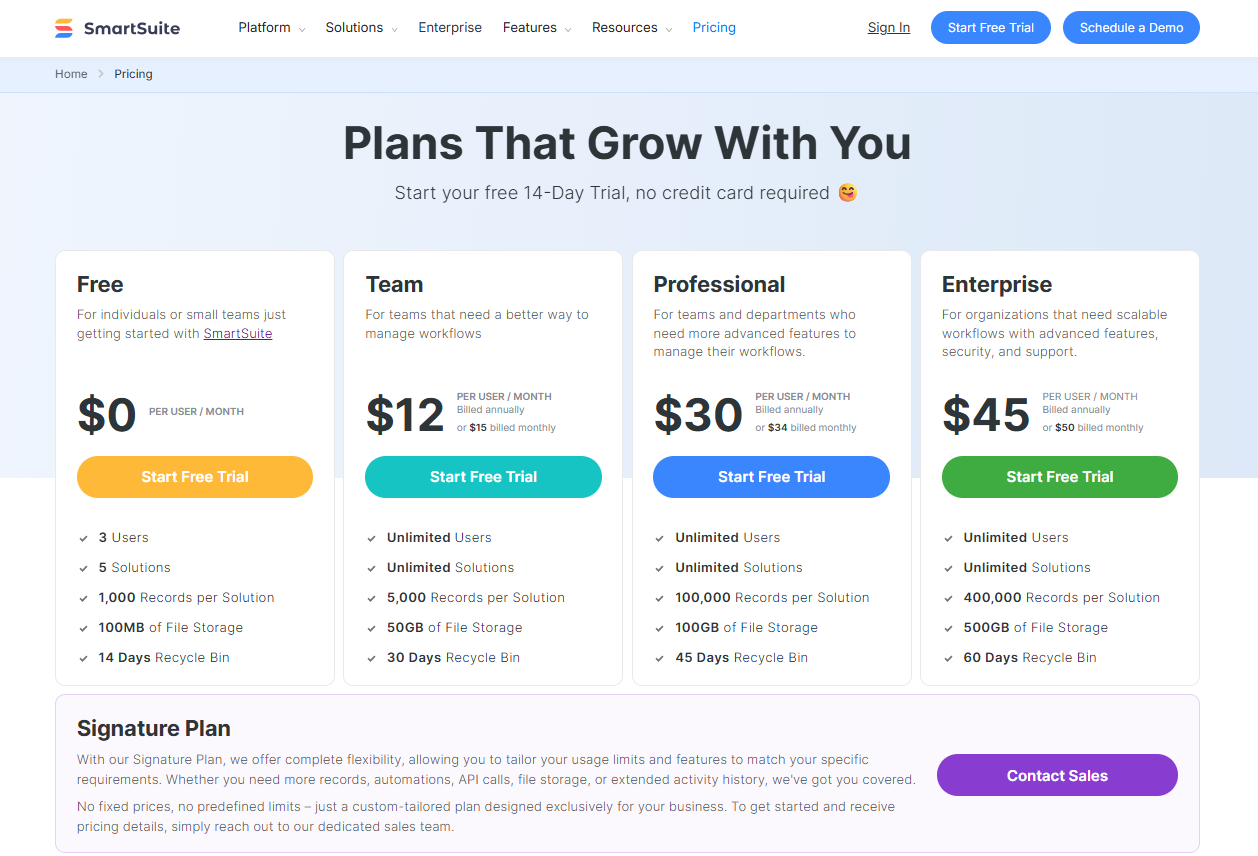
ServiceNow’s Pricing
ServiceNow’s pricing is not currently public, which means that you’d have to book a demo with their team to get a quote.
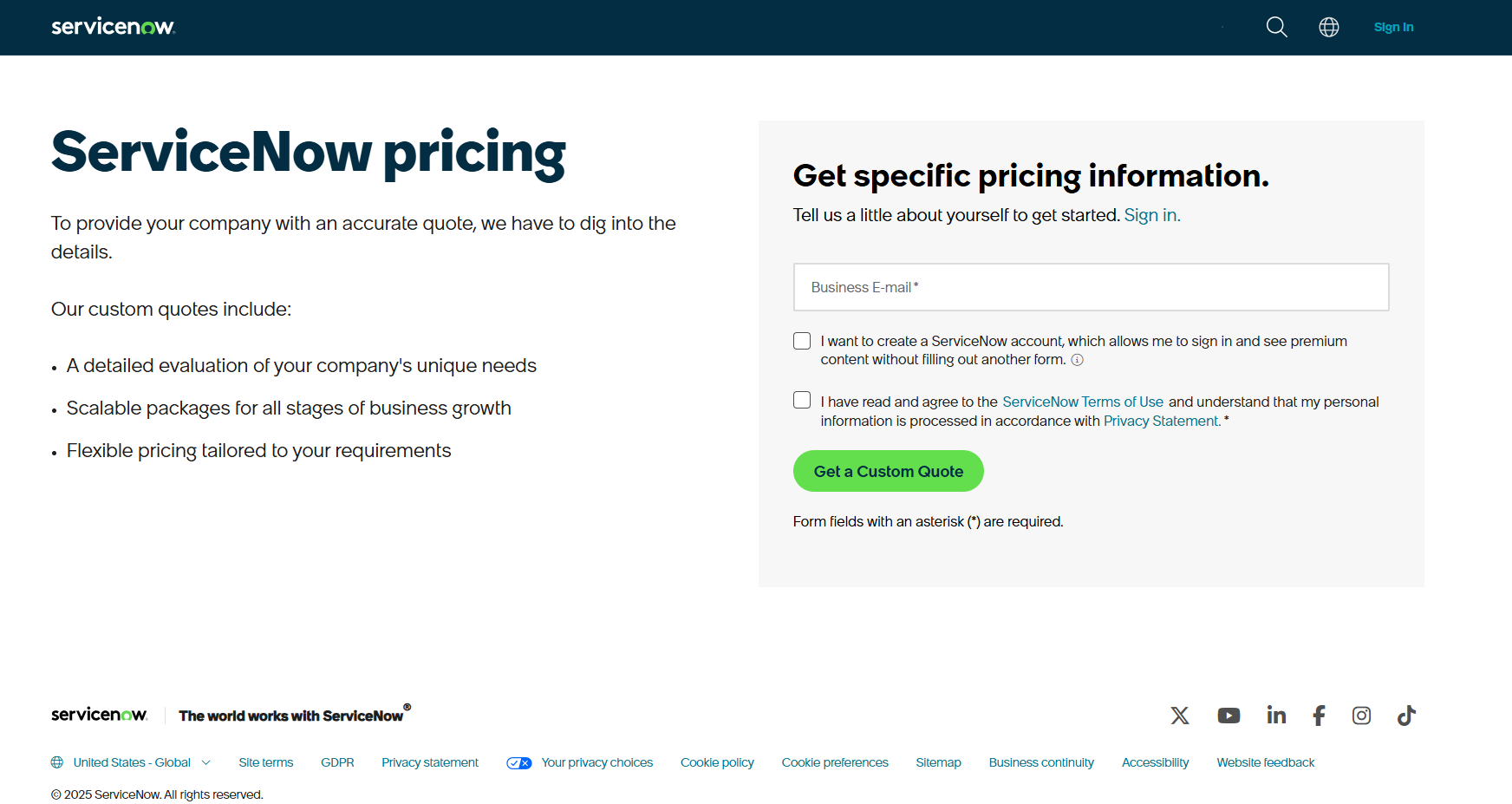
Monday’s Pricing
Monday.com offers a free plan for up to 2 users, including shareable forms, 500MB storage, a 1-week activity history, and one board per dashboard.
Monday.com pricing plans have four tiers and require a minimum of 3 user seats:
- Basic: Starts at $17/user/month, including Kanban view, unlimited free viewers, and unlimited boards.
- Standard: Starts at $20/user/month, including 250 automated actions/month, 3+ dashboard views, and Zoom integration.
- Pro: Starts at $32/user/month, including all five dashboard views, time tracking, and 2-factor authentication.
- Enterprise: Includes a dedicated customer success manager, cross-project analytics, and resource allocation insights. Contact sales for a quote.
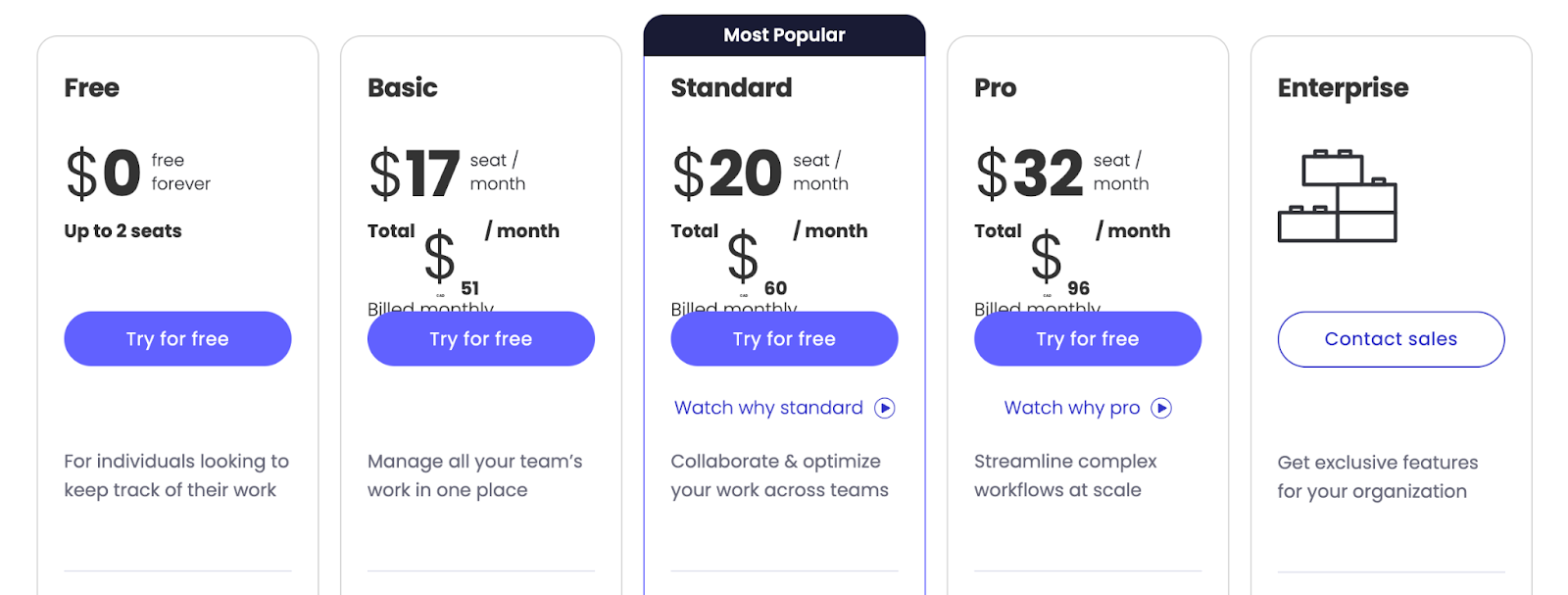
💡 In our guide on Monday’s pricing, I dive deeper into whether the platform has good value-for-money plans.
What are customers saying about ServiceNow, Monday, & SmartSuite?
TL;DR:
- ServiceNow users are fond of its enterprise-grade ITSM capabilities, no-code automation builder, and deep ITIL alignment. However, the tool can be complex, expensive, and requires significant time and expertise to implement.
- Monday customers praise the tool for its visual UI, flexibility, templates, and automation capabilities, which make it easy to get teams working quickly. Common critiques focus on the learning curve for complex setups and occasional limits when boards grow very large or need deep enterprise-grade CMDB functionality.
- SmartSuite users like its user-friendly design, no-code customization, built-in collaboration tools, and strong value for money. That said, some reviewers note fewer native integrations for enterprise tools.
ServiceNow Reviews
G2 Rating: 4.4/5.
What users love:
- Powerful incident and workflow automation.
- Best-in-class tracking and reporting.
- Wide array of built-in ITIL processes and integrations.
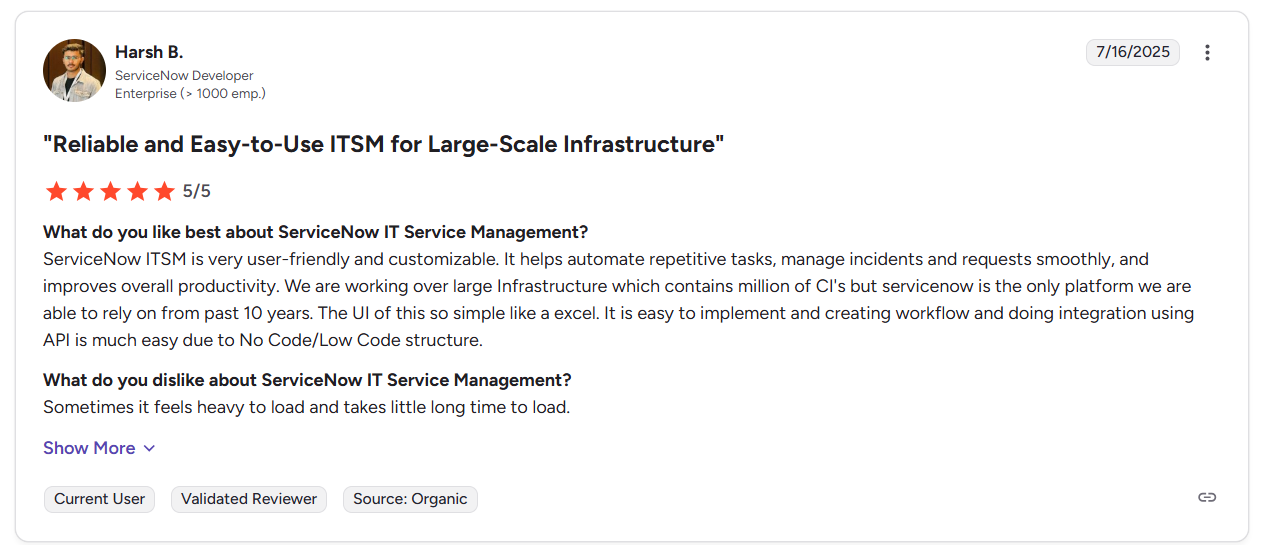
‘’ServiceNow ITSM is very user-friendly and customizable. It helps automate repetitive tasks, manage incidents and requests smoothly, and improves overall productivity.’’ – G2 Review.
Common complaints:
- There’s a learning curve and a need for training (which can mean additional costs).
- High licensing and implementation costs have pushed some organizations to remove roles to keep costs down.
- Complexity of customization.
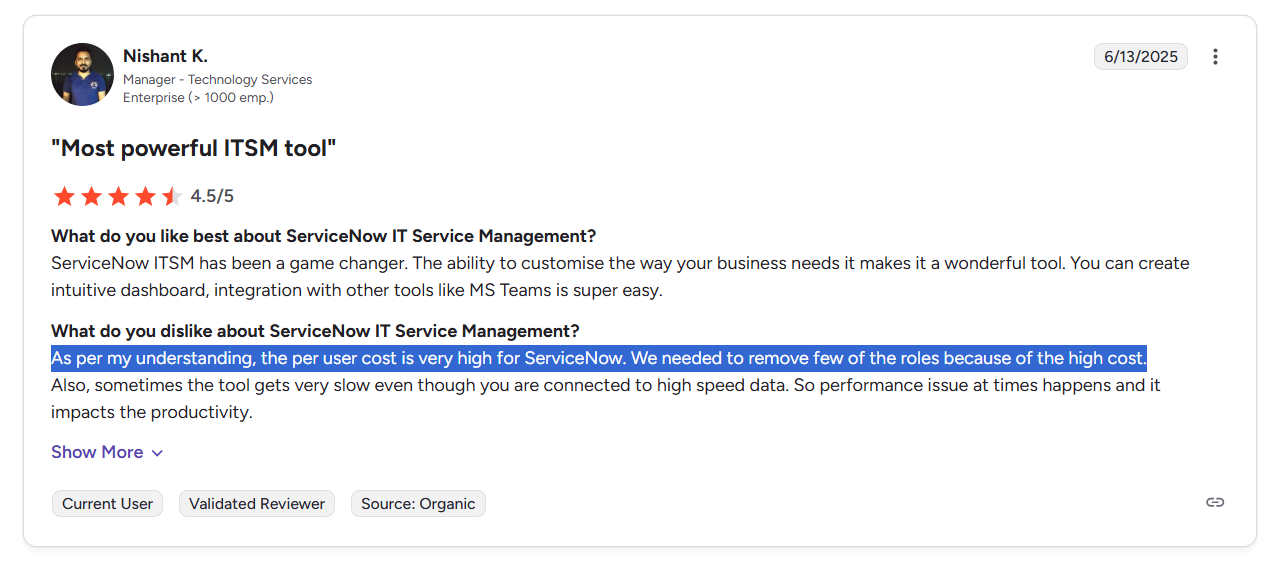
‘’As per my understanding, the per-user cost is very high for ServiceNow. We needed to remove a few of the roles because of the high cost.’’ – G2 Review.
Monday.com Reviews
G2 rating: 4.7/5.
What users love:
- A highly visual interface with multiple view options.
- Extensive customization capabilities.
- Strong automation features.
- Large template library.

‘’I like the dashboard feature where you can bring data from different boards and compare campaign performance. Having a visual representation of the data is very helpful in understanding and implementing positive changes. Also, the AI chatbot is insanely accurate in getting you to the right resources or even solving your issue there and then.’’ – Capterra Review.

‘’There are many different connections within the work environment that can be connected together, like projects and tasks can be easily distributed to everyone, and you can check the status of work that is in progress or completed.’’ – G2 Review.
Common complaints:
- Steep learning curve for new users.
- Group-based pricing can be expensive for small teams.
- Interfaces sometimes feel cluttered and overwhelming due to loads of features.
- Mobile app performance issues reported.

‘’Because it has so many capabilities, it can feel difficult to use - it's easy to overcomplicate things and get bogged down in the actual admin of the tasks rather than the doing. Ironic for productivity management. Also, it's not cheap.’’ – Capterra Review.
SmartSuite Reviews
G2 Rating: 4.9/5.
What users love:
- The tool has an intuitive, spreadsheet-like UI that is easy to get started with.
- Extensive customization and pre-built ITSM templates have helped teams get started in days and not months.
- Built-in collaboration and good value for money overall.

‘’I love how intuitive SmartSuite is from the moment you log in. It's easy to navigate, and the templates really made it simple to quickly realize all the potential ways to utilize the software. I love how easy it is to see progress on a project at any point, and how all files, communication and calendar are tied in within the task. So insanely simple, but there is so much you can do.’’ - Capterra Review.
Common complaints:
- Learning curve for advanced features.
- Per-user pricing can add up in costs over time for larger teams.
- Limited range of native integrations compared to other ITSM solutions on the market.
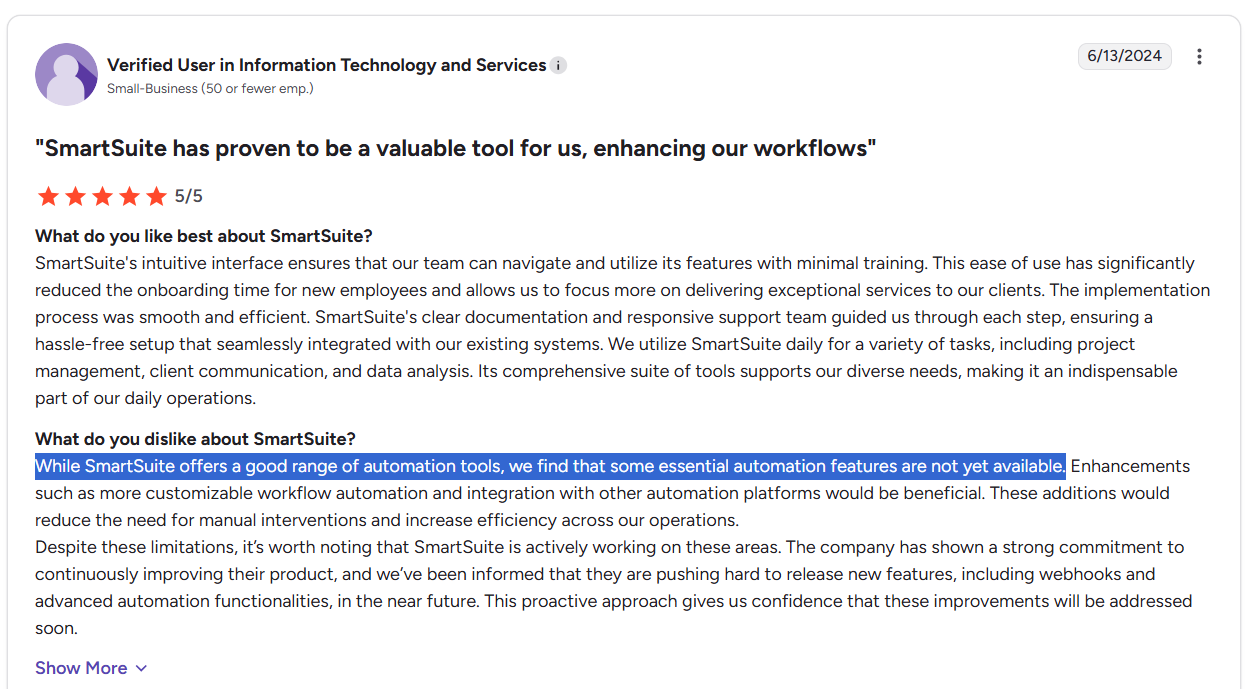
‘’While SmartSuite offers a good range of automation tools, we find that some essential automation features are not yet available. Enhancements such as more customizable workflow automation and integration with other automation platforms would be beneficial. These additions would reduce the need for manual interventions and increase efficiency across our operations.’’ – G2 Review.
Which platform should you choose for ITSM needs?
If you’ve read through the buyer guide so far and still haven’t figured it out, here’s a quick use case summary to help you see the 3 ITSM tools from a bird’s eye view: ⬇️
SmartSuite is the right choice if you:
✅ Are looking for an all-in-one IT service management solution with a user-friendly, no-code interface and drag-and-drop customization.
✅ Need an affordable ITSM solution that scales from small IT teams to enterprise IT departments.
✅ Look for ready-to-use ITSM templates (help desk, service requests, asset tracker) to get started in days and not months.
✅ Prefer built-in automation and customizable dashboards to monitor SLAs, tickets, and IT projects in real time.
✅ Need mobile access for your IT staff to resolve tickets, manage assets, and stay connected on the go.
SmartSuite isn’t the best option if you:
❌ Require a legacy ITSM vendor with a decades-long enterprise track record like ServiceNow.
❌ Are looking for deep, pre-built ITIL workflows.
❌ Require hundreds of native enterprise integrations (ServiceNow and Monday offer larger marketplaces as of 2026).
ServiceNow is the ideal choice if you:
✅ Manage IT operations at a large enterprise or across many departments and need a single, unified platform.
✅ Require a highly customizable, ITIL-aligned solution with enterprise-grade workflows.
✅ Have the budget and resources for a full-featured platform that can scale globally.
✅ Need advanced automation, AI-driven capabilities, and extensive integration options.
ServiceNow isn’t the best choice if you:
❌ Are a part of a small or lean IT department and require a simpler, quicker setup with lower cost.
❌ Don’t look for extensive customization or formal ITIL processes.
❌ Have budget constraints, as licensing and implementation costs are high, which is why some IT leads have been looking for ServiceNow alternatives.
Monday is the ideal choice if you:
✅ Need a configurable, visual ITSM platform that non-technical teams can adopt quickly.
✅ Want fast time-to-value with prebuilt templates, no-code automations, and an intuitive ticketing portal.
✅ Are looking to combine help-desk ticketing, asset tracking, and knowledge in one shared Work OS.
✅ Prefer built-in AI triage and auto-categorization to reduce repetitive tickets and speed first-touch resolutions.
Monday isn’t the best choice if you:
❌ Require a full, enterprise CMDB with out-of-the-box, ITIL-deep change orchestration and discovery at scale.
❌ Need heavy, pre-packaged integrations with complex change and configuration tooling (ServiceNow often has deeper, out-of-the-box enterprise connectors).
❌ Have extremely rigid, audit-heavy ITIL processes that demand ITSM product depth and specialized modules.
Set Up Your ITSM Workspace In Days & Not Months With SmartSuite’s Templates
If you’re an IT lead looking to build IT service management workflows, give SmartSuite a chance with our free plan and out-of-the-box ITSM templates.
SmartSuite eliminates the complexity by combining IT Service Management, IT Operations and IT Business Management, all in one platform.
With centralized workflows, built-in automation, and real-time visibility, your IT team can streamline operations and keep IT aligned with business priorities.
Here’s what's in it for your team when you try SmartSuite:
- Access to a free plan with features including multi-board views (Kanban, Chart, Map, Timeline, Card, and Calendar), 100 automations/month, and 40+ field types, including formula and linked record fields.
- No-code automation builder to set up to 500,000 trigger/action workflows.
- Built-in productivity tools, including time tracking, status tracking, and checklists.
- Team collaboration and planning tools such as whiteboards and SmartSuite docs.
- Resource management across projects and teams.
- 40+ field types, including the option to add your custom fields.
Sign up for a free plan to test the water or get a 14-day free trial to explore all its amazing features.
Or, if you’d like to talk to our team of experts, schedule a demo.
⚠️ Disclaimer: This article was last updated on 21/11/2025 and if there's any misinterpretation of the information, please contact us and we will fact check it.
Read More
- MetricsStream Pricing: Is It Worth It In 2026?
- ServiceNow Review: Is It Worth It in 2026?
- 10 Best MetricStream Alternatives for GRC in 2026

Run your entire business on a single platform and stop paying for dozens of apps
- Manage Your Workflows on a Single Platform
- Empower Team Collaboration
- Trusted by 5,000+ Businesses Worldwide















